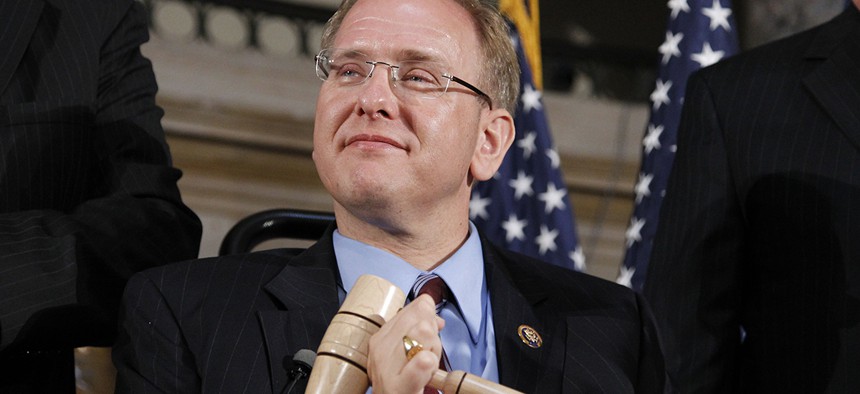Hill Leaders: You Need Us to Make the Cyber Executive Order Work

Rep. Jim Langevin, D-R.I. Alex Brandon/AP
Congress will play a key role in ensuring successful implementation of the order’s directives to protect government and critical infrastructure systems.
Editor's Note: This article was updated to note the Senate committee would hold a markup Wednesday.
Hill cyber leaders generally praised President Donald Trump’s cybersecurity executive order, which dropped Thursday afternoon, but stressed Congress’ role in ensuring successful implementation of the order’s directives to protect government and critical infrastructure systems.
Rep. Jim Langevin, who co-founded the Congressional Cybersecurity Caucus, praised the order’s focus on centralizing cybersecurity within government. He also noted strong similarities between the order and Obama administration cyber efforts.
“In my time working on cybersecurity in Congress, it has always been a bipartisan issue, and I hope the administration will work closely with Congress to implement the measures laid out in the document,” Langevin said.
House Homeland Security Chairman Michael McCaul praised the White House and Homeland Security Department’s “past engagement” on the bill and said he “look[s] forward to robust continued engagement in its implementation.”
Government’s Cyber Org Chart is Taglia-terrible
Sen. Claire McCaskill harangued the Trump administration for long delays in hiring top cyber officials during a Wednesday hearing, including the top two DHS cyber officials and others at the Defense, State, Commerce and Justice departments.
“Right now, we’re needlessly fighting with one hand tied behind our back,” McCaskill said. The Missouri senator also urged the government to rationalize its messy division of cyber responsibilities, which she said is “worse than spaghetti.”
House and Senate Homeland Security Committee staffers are in talks over legislation that would elevate DHS' cyber division into its own agency and make it easier for DHS to respond to cyberattacks at other agencies, said McCaskill, who is the ranking Democrat on the Senate committee.
“Despite the significant role the department plays in the nation’s cybersecurity efforts, cyber appears to be a secondary function within DHS,” she said.
Markup to Watch
Senate Homeland Security and Governmental Affairs scheduled a markup Wednesday for a slew of federal agency operations and workforce-related bills. The schedule includes the Federal Agency Customer Experience Act, which would simplify the process agencies go through to gather public feedback about their customer service, and the OPEN Government Act, which would require agencies keep their data open and accessible for transparency’s sake and to spark private-sector innovation.
Other Hearings to Track
The House Transportation and Infrastructure Committee examines the future of air traffic control Wednesday 10 a.m. The same day, the Government Publishing Office Director Davita Vance-Cooks shares the agency’s plans to transform for future needs with the House Administration Committee.
On Thursday, the House oversight committee gets an update on federal employee compensation, the House Appropriation subcommittee examines emerging tech trends in that sector, and the House Homeland Security Committee reviews the accomplishments of the agency’s working dogs, man’s best sensors.
Not So Fast, FCC
Shortly after comedian John Oliver’s segment on net neutrality aired, the Federal Communications Commission website cracked under the weight of traffic. FCC Chief Information Officer David Bray said the distributed denial-of-service attacks slowed down the site’s commenting systems, but Sens. Ron Wyden, D-Ore., and Brian Schatz, D-Hawaii, want commission Chairman Ajit Pai to cough up the details on the attacks. They also want to know how it impacted the public’s ability comment and what steps the agency is taking to mitigate problems in the future.
More on Comey
After the president fired FBI Director James Comey on May 9, House oversight Chairman Jason Chaffetz, R-Utah, requested the Justice Department inspector general delve into the matter as part of an ongoing look at the bureau’s actions during the 2016 presidential election.
Deputy Attorney General Rod Rosenstein, whose memo was used as one justification for Comey’s firing, will brief the full Senate sometime next week, a spokesman for Minority Leader Chuck Schumer, D-N.Y., said Friday.
Heather Kuldell and Joseph Marks contributed to this report.
NEXT STORY: HHS’ Cyber Threat Center Comes Out of Beta Soon


